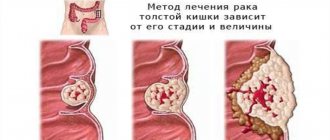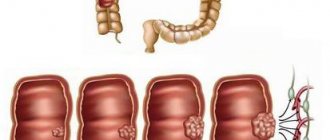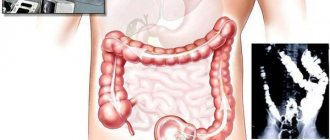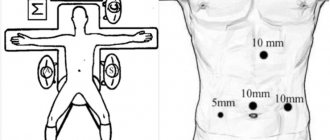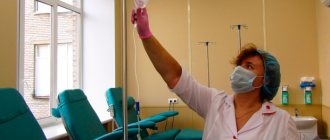Rectal cancer is a malignant neoplasm associated with an increased risk of local recurrence. Great complexity is explained by the complex anatomical features of the rectum:
- Limitation by the bony structures of the pelvis;
- Location close to the pelvic floor muscles and other organs;
- The presence of an anal sphincter, several levels of blood supply and lymph outflow in different directions.
This worsens the prognosis after treatment of the disease.
Doctors at the Yusupov Hospital diagnose rectal cancer, early metastases and relapses using the latest equipment from the world's leading manufacturers. Oncology surgeons perform radical operations, excising the tumor within healthy tissue.
After surgery, the latest chemotherapy drugs are prescribed that destroy cancer cells. The primary site and pathways of metastasis are irradiated using modern radiotherapy devices. All this together allows us to improve the prognosis of survival after surgery for stage 2, 3 and 4 rectal cancer.
Features of treatment of rectal cancer
Doctors at the Yusupov Hospital provide multidisciplinary treatment for rectal cancer. Radical or local treatment is carried out, sphincter-preserving operations or abdominoperineal extirpation of the rectum are performed using an open approach or laparoscopically. The following factors are important for the prognosis of the disease:
- Surgeon experience;
- Surgical technique;
- Assessment of tumor prevalence at the preoperative stage.
Surgeons at the Yusupov Hospital have extensive experience in performing surgical interventions on the rectum and masterfully perform all operations developed today. Before the start of surgical treatment, a comprehensive examination of the patient is carried out. It includes an analysis of complaints and history of the development of the disease, digital examination of the rectum, and sigmoidoscopy. To determine regional and distant metastases, ultrasound, computed tomography and magnetic resonance imaging are performed.
In accordance with the recommendations of the National Cancer Institute, preoperative or postoperative radiation therapy is performed, usually in combination with chemotherapy treatment. It improves local tumor control, although it does not always increase overall survival in colorectal cancer.
In order to improve the prognosis of survival for rectal cancer at the Yusupov Hospital, the proximal border of the rectum (the place where the shadows merge) is determined during surgery. Endoscopic determination is most important for prescribing neoadjuvant therapy if the tumor is located 15 cm above the edge of the anal canal as marked on a rigid proctoscope.
Treatment methods
There is only one method of treating paraproctitis - surgical. As part of the operation, the abscess is opened and its cavity is sanitized.
At the Global Clinic, surgical intervention is carried out only after a thorough diagnosis and with the help of the latest equipment of the latest generation - a laser generator from the ForceTriad high-energy installation.
Advantages of equipment at Global Clinic:
- the installation has less power than the classic coagulation method, which reduces the amount of soot and sparks;
- the device itself determines how much power to apply for excision and coagulation in order to increase efficiency and reduce trauma to the tissues around the anus;
- short recovery time for the patient;
- rapid healing of wounds.
Classification of rectal cancer tnm
In Russia, the TNM classification of rectal cancer has been adopted. I distinguish 4 stages of rectal cancer.
Criterion T stands for tumor. Tx is set when there is insufficient data to evaluate the primary tumor. Tis is a preinvasive carcinoma. In T1, the tumor extends into the submucosal layer of the intestinal wall. T2 means that the tumor has spread to the muscle layer of the rectum and has not invaded its wall. If the tumor grows through all layers of the intestinal wall and spreads into the fatty tissue without affecting neighboring organs, oncologists use the designation T3. For tumors located in the upper ampullary rectum and rectosigmoid colon (covered by the peritoneum), the T3 symbol characterizes the spread of the cancer tumor to the subserosal layer. It does not penetrate the serous membrane.
At stage T4, the neoplasm grows into surrounding organs and tissues or the serosa when localized in the upper ampullary rectum and rectosigmoid colon (covered by the peritoneum). T4a indicates invasion of the visceral peritoneum, T4b indicates invasion into other organs.
Criterion N – lymph node. Nx suggests that there is insufficient data to evaluate regional lymph nodes. If there is no involvement of regional lymph nodes, the condition is designated as N0. With N1 there are metastases in 1-3 regional lymph nodes:
- N1a – in one regional lymph node;
- N1b – in two or three lymph nodes;
- N1c – there are disseminates in the mesentery without damage to regional lymph nodes;
- N2 – metastases in more than three regional lymph nodes;
- N2a – 4-6 lymph nodes are affected;
- N2b – metastases in seven or more lymph nodes.
Criterion M indicates the presence of metastases:
- MO – no signs of distant metastases;
- M1 – there are distant metastases;
- M1a – presence of distant metastases in one organ;
- M1b – distant metastases are present in more than one organ or peritoneum.
Stage zero of rectal cancer is established in the case of Tis, N0, M0. The first stage is defined as T, N0, M0. At stage IIA, the situation looks like T3, N0, M0, IIB – T4a, N0, M0, IIC – T4b, N0, M0. Stage 3 rectal cancer has 3 variants of the course:
- IIIA – T1 – T2, N1/ N1c M0 or T1 N2a M0;
- IIIB – T3 – T4a N1/ N1c, M0, T2 – T3 N2a M0 or T1 – T2 N2b M0;
- IIIC – T4a N2a M0, T3 – T4a N2b M0 or T4b, N1 – N2, M0.
The diagnosis of stage 4 rectal cancer is established for any tumor size, regardless of the number of affected lymph nodes in the presence of distant metastases. For adequate tumor staging, the Yusupov Hospital examines at least 12-15 lymph nodes in the removed specimen, but a smaller number after irradiation.
Universal advice from doctors
Regardless of the type of malignant pathology, experts believe that the basis for successful rehabilitation after cancer is:
Physical exercise
Tumor diseases are almost always accompanied by fatigue syndrome. Effects associated with poor general health may haunt the patient for some time after completion of the treatment course. And you can get rid of such problems with the help of physical exercise.
Of course, all activity must be strictly dosed, and it must be increased or adjusted by a specialist in physical therapy. In addition, it is very important that the patient has sufficient time not only for work, training and household chores, but also for proper rest. Data from numerous studies prove that those patients who undergo individual training programs and regularly expose their body to adequate physical activity return to a normal lifestyle much sooner.
Thanks to correctly dosed activity you can:
- improve the functioning of the heart and circulatory system;
- adjust and maintain normal body weight;
- get rid of stress and chronic fatigue syndrome;
- relieve psychological disorders such as anxiety or depression.
Nutrition
Both during and after treatment, patients should pay special attention to what foods are included in their daily diet. It must be remembered that pharmacological drugs used in oncology can significantly influence changes in taste sensations. In addition, one of the common side effects of these medications is a decrease in appetite, as well as nausea.
However, such disturbances are temporary and after completion of the course of treatment will gradually weaken until they disappear completely. But before they disappear, it is better to try to break your meals into several small portions, and to choose dishes, contact a professional nutritionist. It will help you create a balanced diet, with all the elements necessary for proper metabolism. And at the same time, the individual characteristics of the patient are taken into account, including the complexity of the disease suffered.
Bad habits
Of course, a person needs to get rid of habits that are harmful to his health, such as drinking alcohol and smoking. They increase the risk of relapse, increase the side effects of pharmacological therapy and significantly lengthen the recovery period after cancer.
Psychological support
Often, a surge of euphoria and joy after defeating a malignant disease eventually turns into a kind of disappointment; a person has difficulty finding something to do, and everything seems insignificant to him. Such patients will need, first of all, the help of family and friends who will re-show him the value of relationships, the beauty of the world and arouse interest in life. Sometimes in such cases the intervention of a psychologist will be useful.
Preventive screenings
Measures aimed at preventing recurrence of the disease are of utmost importance in life after cancer. The leading role is played by regular attendance at specialist consultations and medical examinations, according to the schedule developed by the attending physician.
Self-examination of accessible parts of the body: skin, mucous membranes, soft tissues (for example, breast) are also equally important. Unfortunately, an episode of cancer that has already occurred means that the likelihood of another malignant pathology occurring in this person is increased. Now he automatically belongs to the risk group.
Compliance with all medical recommendations, a healthy lifestyle, a balanced diet and adequate physical activity will help you cope with all the consequences of a cancer tumor and return to a full life as soon as possible.
The material was prepared in agreement with the Anadolu doctor, medical oncologist Sinan Karaaslan.
Symptoms of colorectal cancer
At the initial stage of the disease, rectal cancer is asymptomatic. It is detected during routine examination. The most common signs of a malignant tumor of the rectum are the following symptoms:
- Blood in the stool;
- Changes in the frequency, consistency and shape of stools;
- Constipation alternating with diarrhea;
- Abdominal pain;
- Tenesmus (constant, cutting, pulling, burning pain in the rectal area, without stool discharge).
Pain in the rectum of the pelvic cavity is a formidable symptom. At a late stage of development of rectal cancer, complications arise:
- Massive bleeding;
- Colonic obstruction;
- Perforation;
- Germination into other organs;
- Formation of rectovaginal, rectal or rectovesical fistula.
Lymphovascular invasion, perineural invasion, and the presence of tumor deposits outside the lymph nodes are negative prognostic factors. With stage 4 rectal cancer, life expectancy is short.
Diet
After surgery, nutrition should be “gentle”. Therefore, it is important to follow several main principles of the regime. The main thing is to choose the right foods that will ensure normal bowel movements and prevent the development of constipation.
Global Clinic specialists recommend including the following products in your diet:
- vegetables, steamed (with this cooking option you can retain the maximum amount of nutrients) or boiled;
- fresh fruits and herbs (it is recommended to exclude dill and fennel);
- fermented milk products (kefir, soft cheeses, low-fat cottage cheese);
- chicken fillet and white turkey meat, as well as veal;
- rye bread bread and crackers;
- soft-boiled eggs;
- cereals: buckwheat, pearl barley, millet;
- rosehip decoction;
- weak teas with the addition of lemon balm, chamomile or mint.
During the rehabilitation period, it is necessary to eat a variety of foods in small quantities - this will ensure that the body receives the maximum amount of nutrients.
Survival prognosis for colorectal cancer
Determining the stage of rectal cancer is of paramount importance in determining the indications for surgery, since there is no best treatment. Localized tumors have a higher chance of cure. Involvement of regional lymph nodes in the pathological process sharply reduces the favorable prognosis. Important indicators are the size of the tumor and the depth of its germination. Some factors are interrelated: the larger the tumor size, the more likely the risk of metastasis to regional lymph nodes.
When stage I, or stage IIA, rectal cancer is detected, the chance of complete cure is 90%. In stage II B, the 5-year survival prognosis worsens to 70%. If stage 3 rectal cancer is diagnosed, 50% of patients are cured. Even with a fourth stage tumor, 10% to 20% of patients have a chance to be cured. If secondary lesions have formed in the lungs or bones, the prognosis will be extremely unfavorable. Rectal cancer usually spreads first to the lymph nodes and then to the liver. If a single metastasis is identified in the liver, it is removed surgically. When a patient is diagnosed with well-differentiated adenocarcinoma of the rectum, the prognosis is optimistic.
What are the types of colectomy?
There are different types of colectomy, depending on how long of the intestine was removed. During the operation, the surgeon must excise all the tumor tissue and adjacent areas of healthy intestine on both sides.
In a partial or segmental resection, part of the colon is removed, usually one third or one fourth.
A more serious operation is hemicolonectomy . During this procedure, approximately half of the colon is removed. There are right-sided and left-sided hemicolectomy.
Total colectomy —removal of the entire colon. For cancer, such operations are rarely performed. Most often they are used for other diseases, in particular for familial adenomatous polyposis. If the rectum is also removed, the operation is called a proctocolectomy.
After resection, the ends of the intestine are sutured “end to end” or “end to side”. Sometimes the operation is performed in two stages. During the first, part of the intestine is removed and a colostomy is created - an opening that connects the intestine to the surface of the skin. The second stage, usually after 4–6 months, restores the integrity of the intestine.
In most cases, colon resection is supplemented with a course of adjuvant chemotherapy and radiation therapy. This helps destroy remaining cancer cells.
Find out the exact cost of the operation
Can colon resection be performed laparoscopically?
Research results show that laparoscopic operations for colon cancer are not much less effective than open operations. There is virtually no difference in survival rates and the risk of relapse.
During laparoscopic bowel resection, the surgeon makes 3–6 punctures measuring 5–12 mm in the patient’s abdomen. Through them, a laparoscope (an instrument with a video camera and a light source) and special laparoscopic instruments are inserted.
Laparoscopic surgery has a number of advantages over open surgery:
- minimal blood loss and tissue trauma;
- shorter hospital stays;
- shorter rehabilitation period, the ability to quickly return to normal activities;
- in the postoperative period there is no such severe pain as after open surgery;
- lower risk of adhesions, infection and other postoperative complications;
- good cosmetic effect, there is no large noticeable scar left on the skin.
The effectiveness of laparoscopic intervention strongly depends on the experience and qualifications of the doctor, the availability of the necessary equipment in the clinic, and the appropriate equipment of the operating room. When choosing surgical tactics, the doctor must take into account the stage, size and location of the tumor. At the first stage, diagnostic laparoscopy is performed, during which it becomes clear what type of operation will be optimal in this case.
Euroonco performs surgical interventions of any complexity, for any stage of colon cancer. We have experienced doctors and a well-equipped operating room, which allows us to perform unique operations.
